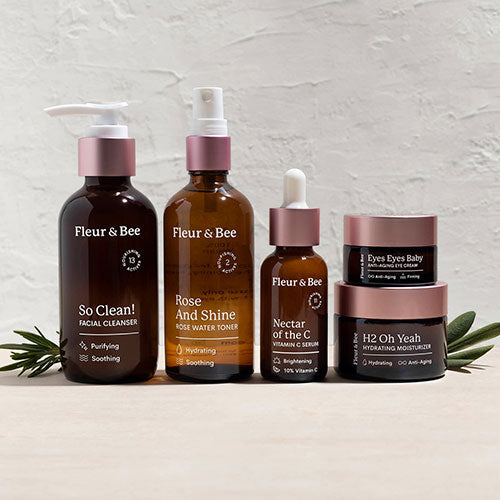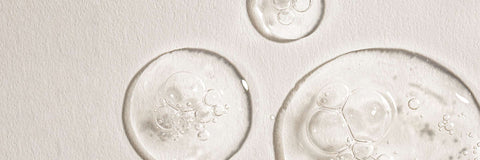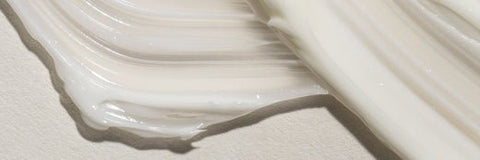If you find yourself attracted to the organic section of the produce aisle like a magnet or scour food labels for that coveted USDA logo, you might be tempted to do the same when it comes to your skincare. After all, if organic is better when it comes to what you're putting into your body, surely it's also better for what you put on your body?
Unfortunately, there's a lot of confusion out there as to what it really means when something is organic, versus natural. In certain situations, synthetic doesn't necessarily mean bad, while organic doesn't always mean better. Keep reading as we lay it all out for you.
IN A NUTSHELL
Main Takeaways: Organic skincare products have their benefits, but you could be missing out on good-for-you ingredients that can't be certified for various reasons. A little know-how in this area can go a long way in deciding what's best for you.
Good to Know: Some superstar skincare ingredients have natural origins but are now created in a lab for cosmetic use — like CoQ10 and vitamin C. Since they're not grown, they can't be considered organic.
Recommended Products: So Clean! Facial Cleanser. This soothing face wash is packed with organic and natural ingredients.
What Does Organic Mean?
What exactly does it mean to be organic? Every country has different standards, and here in the United States, those rules are set by the Department of Agriculture.
There are four types of products that can be certified organic by the USDA. They are:
- Crops — Plants grown to be harvested for food, feed, or fiber.
- Livestock — Animals meant to be used in food or for producing food, fiber, or feed.
- Processed products — Items that have been handled and packaged or combined, like chopped carrots, a can of soup, or skincare products. In order for the final product to be labeled as organic, at least 70% of its ingredients must be organic.
- Wild crops — Plants growing in an uncultivated area.
Regulations are long and detailed; but basically, if you're a farmer or a rancher who wants certification, you have to raise and process crops and livestock a certain way.
That means never using synthetic herbicides, pesticides, fertilizers, or GMOs on your plants and raising animals on organic feed and in humane living conditions. Absolutely no growth hormones or antibiotics allowed. It also involves other beneficial practices, like rotating crops and managing soil in an eco-friendly way.
Sounds pretty great, right? It is! When it comes to food, that is. With organic skincare, things get trickier. That's because you're not just buying a bushel of apples — you're getting a formulated substance that contains all sorts of ingredients, like botanicals, preservatives, and some synthetics.
We've been conditioned to think that preservatives and synthetics are bad words in the beauty world, but that’s just not true. Preservatives protect your skincare products from growing mold and bacteria, and some synthetics are actually better.
Take Vitamin C, for example. Vitamin C is an amazing skincare ingredient, but it's volatile in its natural form. It's called ascorbic acid in that state, and it's highly unstable when mixed with water — an ingredient in nearly every skincare product imaginable. When the two meet, ascorbic acid degrades, becomes ineffective, and can even irritate.
But a neat solution lies within synthetic forms of vitamin C, such as sodium ascorbyl phosphate. (This is the form of vitamin C we used in Nectar of the C, by the way.) It's stable and gentle, yet still potent, and prepared in a lab using the magic of chemistry. However, since it wasn’t grown in the ground, it cannot be labeled as organic by the USDA.
Going Organic vs. Natural
By now, you might be thinking that your best bet is to go with skincare products that contain both organic botanicals and nontoxic, natural preservatives and other ingredients. Well, you are absolutely right. Let’s take that thought one step further.
If you're interested in sustainability, sometimes it's better to go with synthetic when it comes to ingredients that are hard to harvest ethically. Think: algae that is propagated in a lab, or CoQ10 that comes from engineered yeast, instead of shark livers. Often, these alternatives are more shelf-stable, equally nourishing, and kinder to wildlife and the environment.
But– some synthetics should be avoided at all costs. That includes artificial fragrances, dyes, colors, and other “nasty” ingredients like parabens, sulfates, silicones, phthalates, formaldehyde, etc.
Point is: do your research! Eco-minded, mission-driven brands like yours truly will always be painfully transparent when it comes to how we source, process, and package our products in ways that are good for you and the Earth.
Ready to shop skincare products with both science-backed and organic botanical ingredients? Start with our Deluxe Set: a 5-step full skincare routine that includes a facial cleanser, hydrating toner, anti-aging eye cream, vitamin C serum, and hydrating moisturizer.
A Match Made in Heaven
At Fleur & Bee, we focus on offering clean and highly effective vegan skincare that works for everyone. Our cruelty-free line of products includes organic ingredients when possible and sustainable, and our collection has everything you need for healthier, happier skin.
Positive environmental impact is high on our list of priorities. Our products are crafted with sustainably sourced ingredients that are manufactured using 100% renewable wind energy, and all our packaging is made using FSC-certified, 100% recycled post-consumer waste paperboard.







